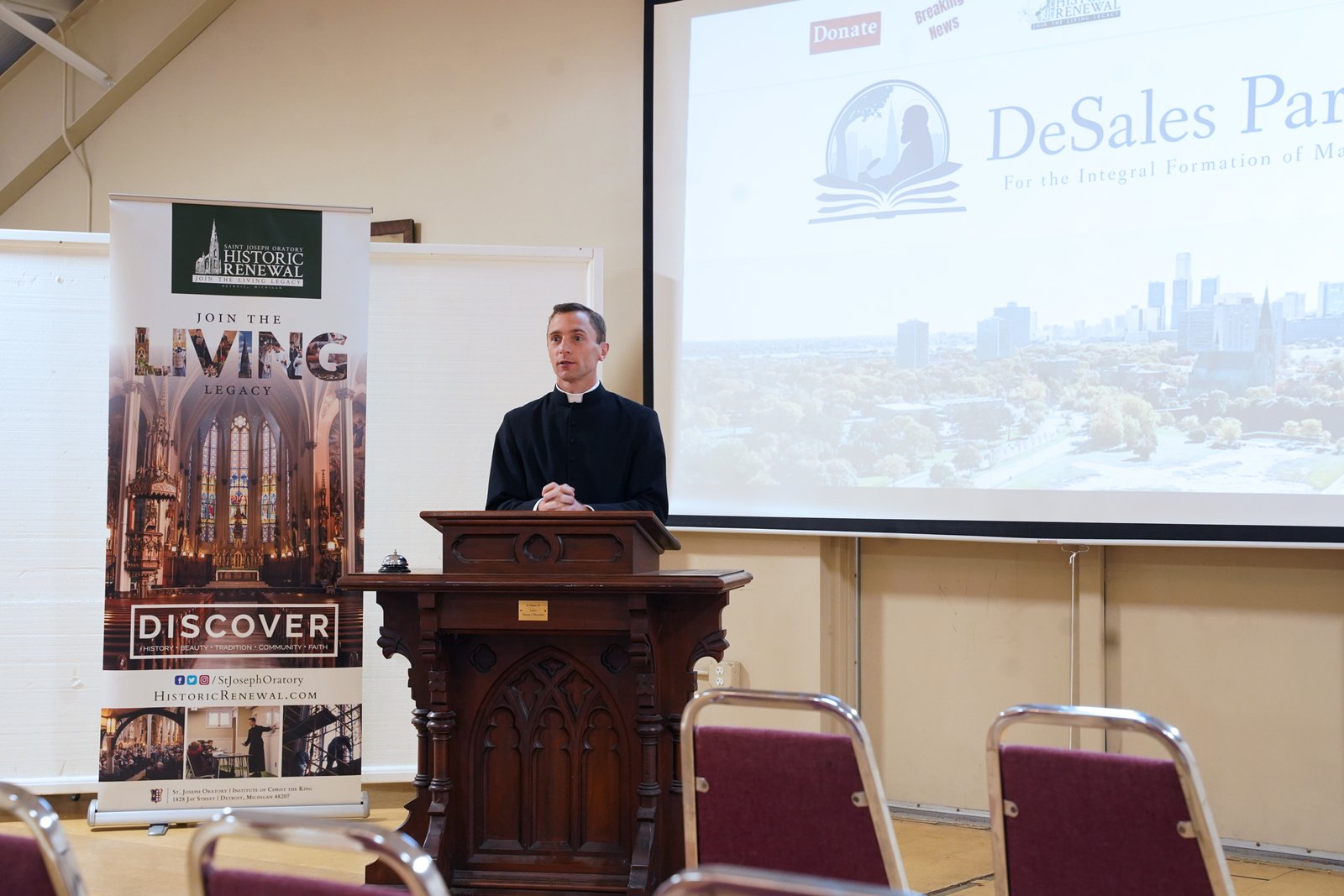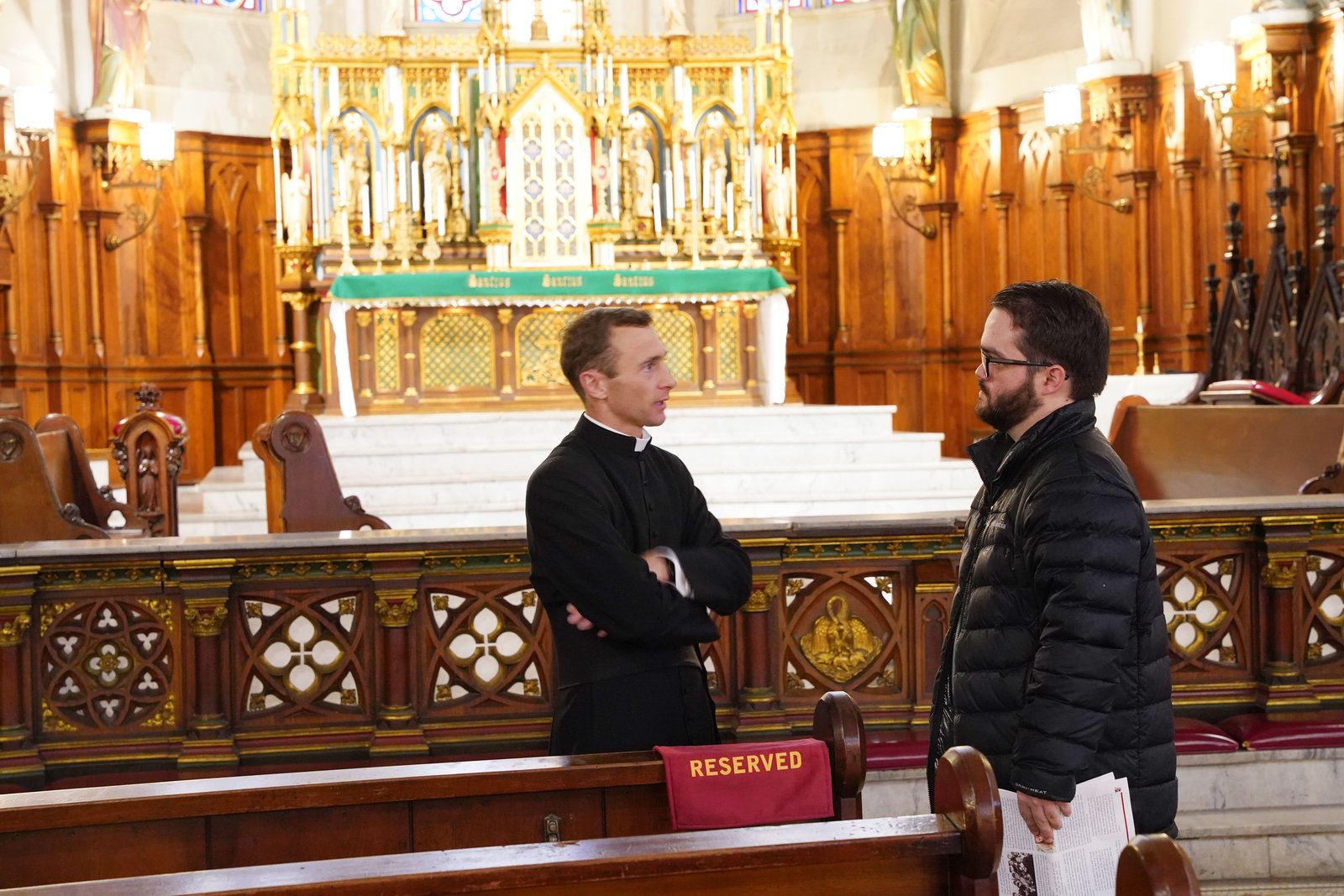Institute of Christ the King Sovereign Priest buys high-traffic property for $2.75M, with visions of a new social hall, middle school
DETROIT — The Institute of Christ the King Sovereign Priest, the religious community entrusted with the care of St. Joseph Shrine in Detroit, announced it is under contract to purchase the 4.2-acre lot across the Dequindre Cut near Eastern Market, with plans to build a social hall, and eventually, a middle school.
Parish leaders announced the plans during a news conference at the church on Nov. 19.
Canon Jean-Baptiste Commins, ICKSP, pastor of St. Joseph Shrine, spoke to media about the $2.75 million purchase, which was made possible through a substantial donation from an anonymous donor and contributions through other benefactors.
The purchase is part of an ambitious, multi-phase, $10-$20 million project, which includes fencing off the property, installing a statue of the Sacred Heart on the grounds, creating a pedestrian walkway across the Dequindre Cut, and eventually, building a social hall and school. The overall campaign includes establishing an endowment for funding the school's operations.
The property is bounded by Gratiot Avenue, East Vernor Highway, St. Aubin Street and the Dequindre Cut and once was the location of the original Joe Muer Seafood Restaurant on Gratiot.
The lot is currently a derelict field that is used as auxiliary parking during Detroit Lions games and St. Joseph Shrine's annual Oktoberfest festival.
The property is to be renamed DeSales Park, after St. Francis de Sales, the institute's patron, and allows the parish to consider further expansion projects, such as a larger social hall and event center, and eventually, a middle school sponsored by the Institute of Christ the King Sovereign Priest, Canon Commins said.

The land acquisition and plans for further developments are a product of the graces the St. Joseph Shrine community and surrounding neighborhood have seen since the Institute of Christ the King Sovereign Priest was invited to care for St. Joseph in October 2016.
"For the past eight years, we have seen constant growth and support, which tells us we certainly can do more," Canon Commins said at the news conference. "The tree is ready now to give more fruits. It's definitely a beacon of hope for the city, not just for Catholics. But when you drive down Gratiot and you see the facade of the church being restored, and this new project now, it is a beacon of hope for people in the city and outsiders coming in that there is growth in the city of Detroit, and that our commitment, the institute's commitment, to the city of Detroit is here to stay."
St. Joseph Shrine, located at 1828 Jay Street, began as a parish in 1855 to serving the German-speaking Catholics who congregated around lower Gratiot on Detroit's east side.
The current church edifice was erected in 1873 and is on the National Register of Historic Places.
In 2013, St. Joseph Parish was merged with Sweetest Heart of Mary and St. Josaphat parishes to form Mother of Divine Mercy Parish. In 2016, Detroit Archbishop Allen H. Vigneron invited the Chicago-based Institute of Christ the King Sovereign Priest, a religious community that celebrates the Traditional Latin Mass with the 1962 Roman Missal, to establish a personal parish at St. Joseph.
The parish now has 370 registered households and an estimated 700 people who attend its three Sunday Masses.
The parish launched a three-phase, $2.5 million historical renewal campaign in October 2017, with the centerpiece being the restoration of the church's 200-foot steeple that was completed in September 2019.

Canon Commins said the donation to purchase the DeSales Park property is completely separate from the historical renewal campaign, adding the primary benefactors had not previously donated to the campaign.
"The park campaign is privately funded so far with independent donors who wish to remain anonymous," Canon Commins told Detroit Catholic in an exclusive interview. "We have solicited quite a few donors who have not been involved with the restoration projects at the Shrine. We want to make it clear that, for the time being, the funding is separate from the current funding of the historic renewal campaign. We do not wish to diminish from the funding effort of the restoration."
The parish's history is being recounted in a documentary titled "Living Stones," written and directed by St. Joseph Shrine parishioner and filmmaker Joe Pelletier.
"We had initially set out to make a 10-minute video showcasing the Shrine, but after beginning our research and spending time in the parish archives, we came across one amazing photo after another, many of which hadn't been seen publicly for years," Pelletier said. "We realized that we had a story here that was incredible — too incredible to condense into a short film."
Pelletier said the documentary, which is showing at the parish social hall after each of is Sunday Masses and will soon be available online, interweaves the parish's history along with the histories of the city of Detroit and the Archdiocese of Detroit.
"While the parish has produced written histories for each of its significant milestones, this is the first time the story has been presented on film, and it was a tremendous honor to lead this landmark project," Pelletier said.

Since the institute's arrival at St. Joseph, which was declared an archdiocesan shrine in 2020, the parish has grown by leaps and bounds.
The parish has 92 children in its catechism classes and 70-80 in its homeschool co-op that meets on Wednesdays in the parish social hall or the classrooms in the rectory basement.
Plans are for the parish to build a new social hall on the property that can hosts catechism classes and the co-op, with the greater vision being the establishment of a middle school on the property.
The Institute of Christ the King Sovereign Priest sponsors schools in France and Belgium, but such a school would be the religious community's first in the United States and serve a need for families looking for a Catholic classical education in the city of Detroit.
"We have (schools) in Europe, such as in Paris, where I myself was a student, and it's one of the top schools today in France, with a high school and middle school and classrooms for students with special needs as well," Canon Commins said. "The (schools have the) charism of St. Francis de Sales, the great educator, and Don Bosco. In Belgium, we have the international school teaching in French and English with over 600 students from 58 different nationalities and bearing many good fruits. Our vision is to transport that in the United States, and Detroit seems to be a great potential for the endeavor with the support of the archbishop and the Archdiocese of Detroit."
Canon Commins said the parish has looked at properties across the area, including in Wayne and Hamtramck, as a place to host the homeschool co-op, but there was a desire for the community to stay rooted at St. Joseph and the Eastern Market district.
"After discussions with our parishioners, it was important for us to stay close to the Shrine. This is the beacon of hope we have for our community and the city of Detroit," Canon Commins told Detroit Catholic. "This will be a great way to expand our existing efforts, and God willing, a school."

When the 4.2-acre property became available for purchase, the institute worked with the Archdiocese of Detroit to submit an offer, which was accepted, with the 60-day due diligence period ending Nov. 4.
A $1 million down payment toward the purchase price under the land contract was required at closing, with another $1.7 million that will be paid to the seller within a year.
The parish reports a benefactor secured the down payment on the property and promised another $1 million as a matching gift to cover the remaining payment. The parish is aiming to raise an additional $2 million for the effort, and hopes to break ground as soon as possible.
St. Joseph Shrine has already contacted an architect to plan out a design, with the first step to be erecting a permitter fence around the property.
Currently, the lot is used as auxiliary parking for big public events such as Detroit Lions games, access to the Dequindre Cut on Gratiot and the Dequindre Cut Food Truck Rally.
The parish could still allow parking for Lions games and other events, but the first goal is to secure the property with perimeter fencing to give DeSales Park a distinct identity.
"It is certainly an iconic location for the city of Detroit, in the heart of one of the most iconic places in town, Eastern Market," Canon Commins said. "There is the potential for renting spaces for parking for events like Detroit Lions games and the Food Truck Rally at the Dequindre Cut. The city has reached out about these kinds of endeavors. Hopefully, we can start breaking grown as soon as possible, depending on funding."
The property will be owned by the Institute of Christ the King Sovereign Priest, a sign of the religious community's long-term plans to minister in the city, Canon Commins said.
"One of the wishes of the donor of the property was that it remains under the direction of the Institute of Christ the King, because they have seen the fruits elsewhere in Milwaukee, where now (the institute) owns the church and school building attached to it," Canon Commins said.

Canon Commins said a statue of the Sacred Heart of Jesus will be installed on the property, entrusting the entire project to the Sacred Heart, and an outward sign of revival in the neighborhood.
"The first thing I want to put on the property is a large statue of the Sacred Heart, with (Christ's) back to the city skyline, so when people are driving down Gratiot toward downtown, they see by the corner of the property the statue of the Sacred Heart, and in the background, the city skyline," Canon Commins said. "I believe that is a beautiful way to entrust this project to Divine Providence and the Sacred Heart of Jesus, who promised if you have recourse to His Sacred Heart, He shall bless all your endeavors."
More details about DeSales Park, and ways to donate to the project, are available at historicrenewal.com.
The development of DeSales Park into a space of spiritual formation is an ambitious project, one that will require a great commitment of time, talent and treasure, Canon Commins admits, but if past form is a predictor of what can be accomplished, he thinks the park will be a tremendous blessing for the people of God in southeast Michigan.
"It's certainly very ambitious, but I wouldn't call it a dream, since reality has proven we can accomplish a lot in a short amount of time at the Shrine," Canon Commins said. "In the past eight years or so, we have raised over $5 million from a congregation that eight years ago was supposed to be dead.
"When we see the potential and excitement in the city of Detroit, it gets people excited," he continued. "It's ambitious, certainly, but it's something we can accomplish. It will take years, but baby steps. We have trust in God's Providence, a commitment to teaching the truth, and a love for the beauty of our faith. It's a recipe that has worked in the past and in other places, so why would it be different here today?"
Copy Permalink
Parish life











